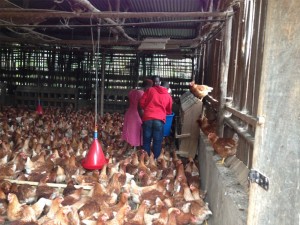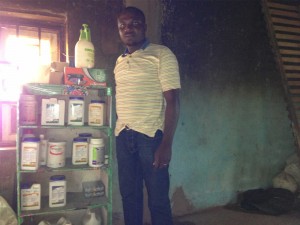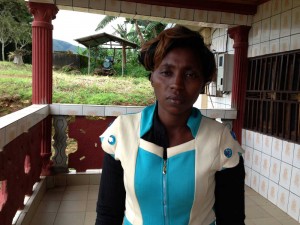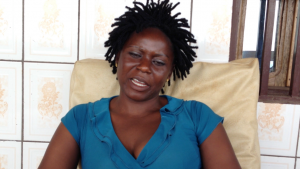Ata Nchomba
Bamenda, Cameroon
Many people raise poultry in Cameroon to feed their families; to some, it is a hobby. For Mr. Takang Daniel of Bambili, in the North West Region, it is a small business to be self employed and to employ members of the community. Daniel was inspired by his father who raised chicken as a hobby; he developed interest in poultry and started saving money from small jobs to start Hill Top Poultry Farm 10 years ago. However, he could not have started the farm without the support of her sister and funding from the World Bank through CCAST/AGRIC Cooperative Credit Union Ltd.
Daniel started his poultry farm with 1,000 broilers – these are chickens that are raised and sold for consumption of meat. Few years later he increased the number of chickens to 1,500. Today, the poultry farm has 1,000 broilers and 2,200 chicken layers. Layers produce eggs that are sold to the market for consumption. The farm has a capacity to house up to 10,000 chickens.
At first, Daniel wanted to incubate its own eggs and raise them, but such endeavor was expensive and difficult, so he buys day-old chicks from producers in Bafoussam, Douala and Yaounde to raise them at his farm.
When day-old chickens are brought in, they are stored in a nursery. He says the process is complex because he and his 6 workers have to continuously monitor the chicks so that they are properly fed and kept warm. To feed chicks, workers plant and harvest their own corn which is used in making chicken feed. To keep their chicken warm, they use wood for heating because it is readily available and affordable.
When the chicks become mature, Daniel and his staff sell eggs and chicken to whole sellers in the local market and to hotels and restaurants in the North West and South West regions of the country. The farm sells chicken for prices ranging from 2,500 to 4000 francs CFA depending on age, weight or size.
Daniel reports that they are happy with sales but hope to grow. When asked by iCameroon how he sees the farm in the next five years, he explains that the incubating market is still young and there are many young farmers who are always looking for day-old chicks. Right now Daniel’s farm has a second-hand incubator and he is learning the process of incubating, but he hopes to buy a new incubator with a bigger capacity that will enable him hatch chickens for his farm and the market. He hopes to have 10,000 layers with a good number of parent stocks. To achieve this, however, Daniel says, he will need more financing.
Daniel is not alone with the need to finance. Ms Akanji Adeline, who was visiting Hill Top Poultry Farm to buy eggs for sale, started a small poultry farm 5 years ago in Kumba, South West Region. She too needs about 3 million francs to grow her farm. She started her poultry farm with 50 chickens. Two years later the number of chickens grew to 200. Today, she has 500 chickens. Akanji, like Daniel, sells her chicken to local market and to hotels. Some customers come to her place of business to buy chicken. It takes her sometimes a few days to sell all her inventory.
When asked if there is competition in the poultry business, she responded that there is competition, but she believes that her quality of chickens sells better, but she advises others to start similar businesses, because she believes that it is better for people to become self employed rather than to stay idle.
For other Cameroonians to start and sustain poultry farms, they too will need financing as Daniel and Ms Akanji have explained. Ms Meme Victorine of CCAST/AGRIC Cooperative Credit Union Ltd told iCameroon that there is financing available from the World Bank through their credit union. She, however, says that in order to qualify for financing, a small business must join CCAST/AGRIC and make deposits for at least three months. Ms Victorine was visiting Hill Top Poultry Farm to access the progress of the farm and discuss the possible financing of Ms Akanji’s poultry business in Kumba.







